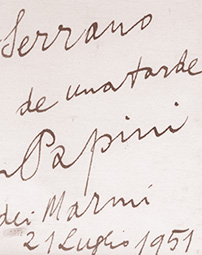
“He will never be able to know what it meant for me to find him.”
It has been many years since I read A Man -Finished (“Un uomo finito”) by Giovanni Papini. A book full of force, with a fervent desire to pass the limits imposed on man by time and circumstance. These pages were pervaded by the ambiance of the land of Florence, in the Tuscan Countryside, and revealed the love of the author for the dusty roads, the old trees and the distant mountains.
I have always had a special predilection for the natural beauty of my homeland. Papini confirmed me in it. I thought I saw a similarity between our mountainsides, between our country trails and those described by him.
My adolescence was thus quite influenced by this book. I admired its author. And if I had met him then, perhaps it would have fulfilled my greatest desire of those years.
Life is extremely curious. It tends to give us the possibility of realizing our aspirations when these no longer exist, either because we have lost all hope of fulfilling them or because we have changed, and other aspirations and urgencies impel us.
Many years later, old desires forgotten, behold! I am in Florence.
The Summer sun falls with a tremendous light, preventing a man from the south of the world from looking very much to the heavens. Walking down the old streets, going up to the Roman and Etruscan ruins of Fiesole and contemplating the countryside of Tuscany with its mountains and it’s soft tones, something arises from the depth of being: it is the distance of years and the memory of the writer and poet who still lives here. To see him now would be like paying tribute to those better times.
Searching in Florence, I have the opportunity to see the Piazza della Signoria, where there is the David of Michelangelo and a fountain with works by Benvenuto Cellini. I contemplate the Palazzo Pitti. I go back across Ponte Vecchio and then ascend the steps of the house of Dante Alighieri. It is these, I think, that Dante would climb up, slowly, his soul fruitful and perfected by the image of Beatrice.
The antiquarians of the Ponte Vecchio have shown me their exquisite works. One of them has also given me directions to Papini’s house. The writer lives on the Via Guerrazzi, number 10.
But Papini is not in Florence. He has gone to spend the summer on the Mediterranean coast, to Forte dei Marmi, near Viareggio.
The train to Viareggio does not arrive until four in the afternoon. In the meantime I can look at the paintings of Fra Angelico in the museum of San Marco. And I find it marvelous that even in this brightness and this heat man can be transported to the depths of an otherworldly light. Because with so much light outside, it can be very difficult to find inside… Nevertheless, the voice of God speaks in Fra Angelico, enveloped in purest light and in the heat of the Italian summer.
I come to Forte dei Marmi in the evening, it is already dark. And I do not see that ancient sea, whose waves can be felt nearby. An automobile takes me to the villa where Papini is staying. And I enter a shadowed, neglected park.
No one comes to meet me; I am guided by a weak light and the buzz of conversation. In this way I stumble into the middle of a family reunion in the garden of the villa.
Some people get up; and after a brief exchange of greetings, they go and leave me alone with the writer and his wife.
Papini is younger than Hesse; nevertheless, he is more worn, more broken. He is tall and has sparse hair. He is completely blind in one eye. It gives the impression of a man who has been leaving pieces of himself behind in his passage through life.
Páginas: 1 2




